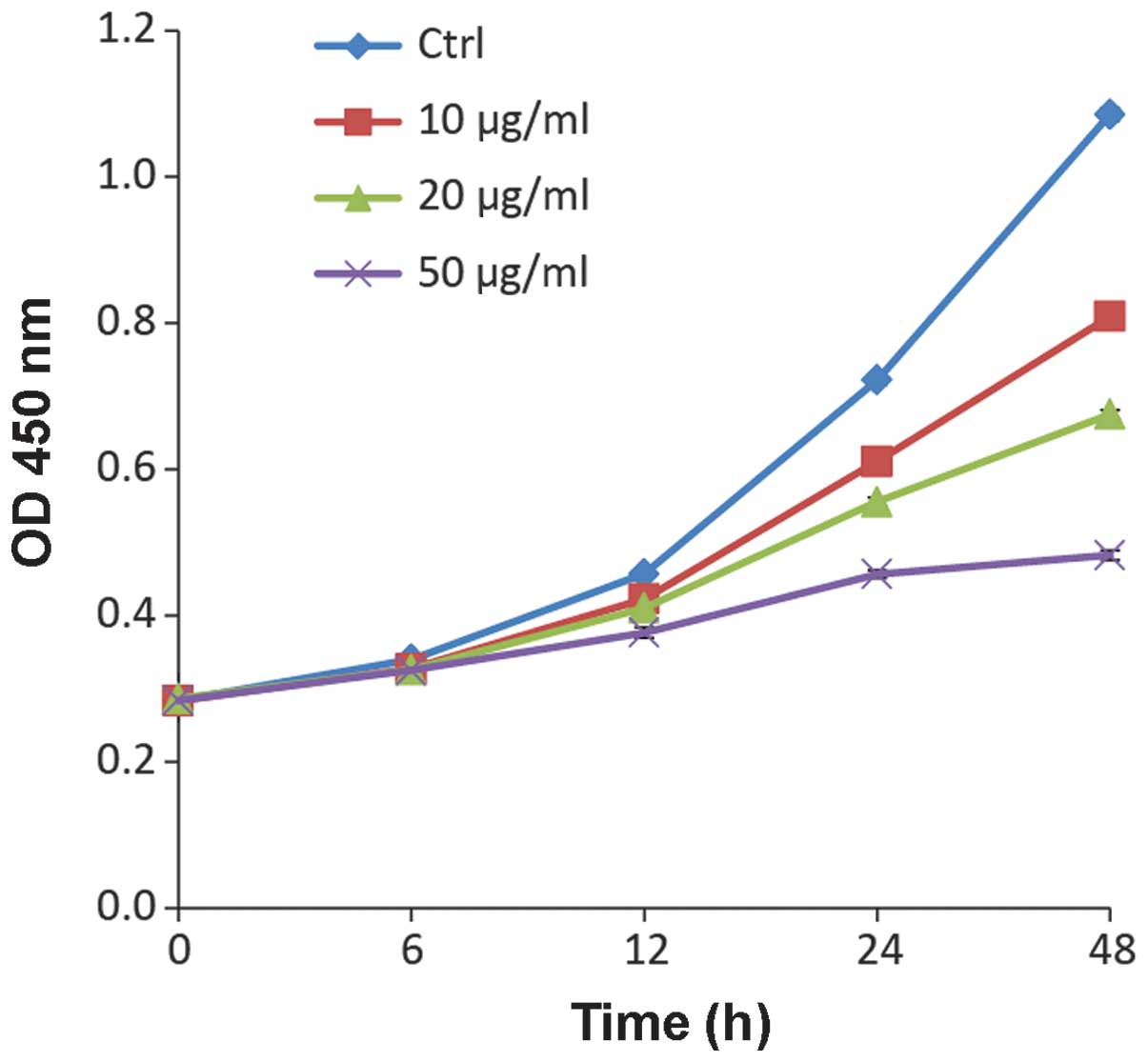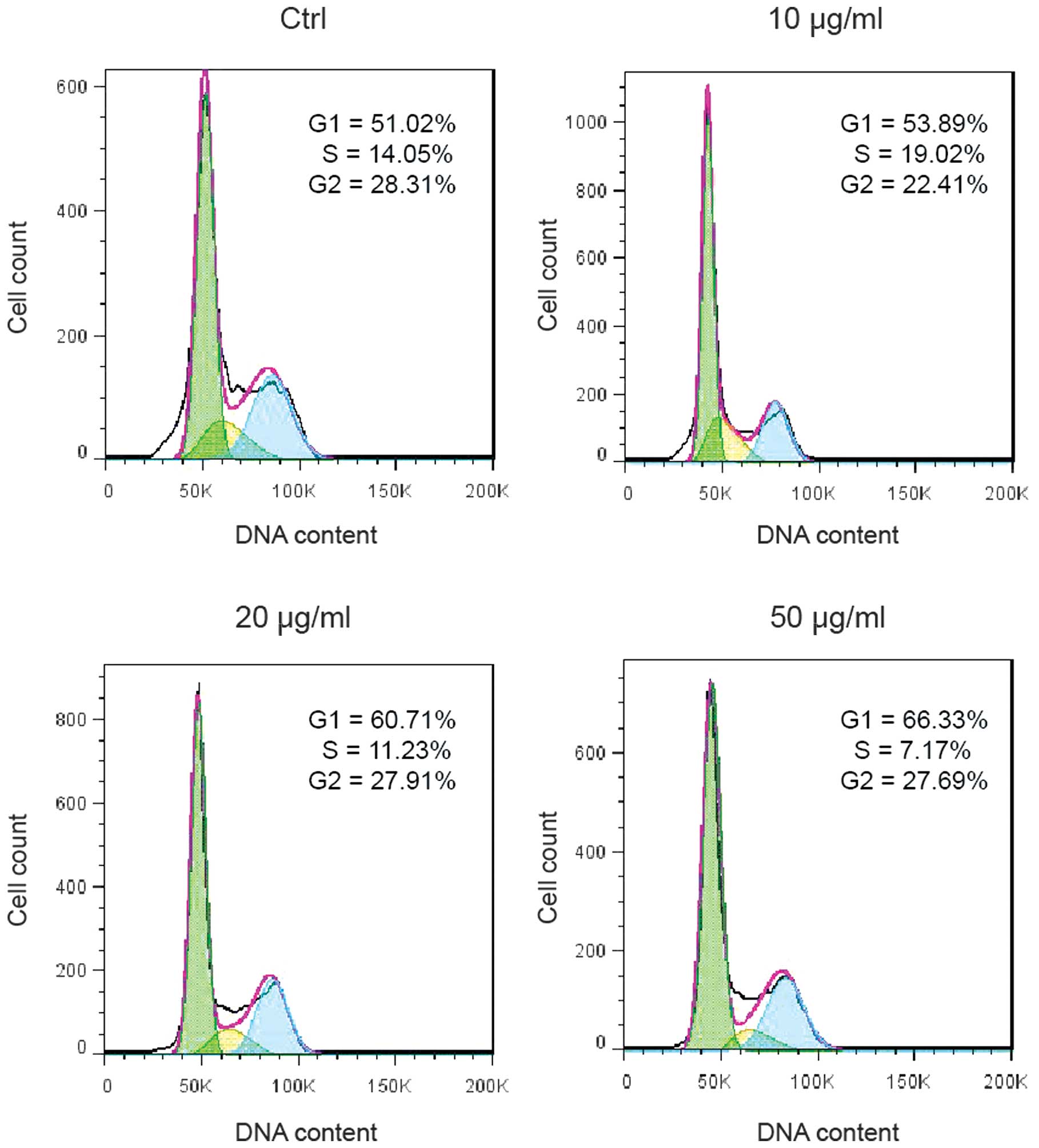|
1
|
Zhang JX, Han QB, Zhao AH and Sun HD:
Diterpenoids from Isodon japonica. Fitoterapia. 74:435–438. 2003.
View Article : Google Scholar : PubMed/NCBI
|
|
2
|
Zhao W, Pu JX, Du X, Su J, Li XN, Yang JH,
Xue YB, Li Y, Xiao WL and Sun HD: Structure and cytotoxicity of
diterpenoids from Isodon adenolomus. J Nat Prod. 74:1213–1220.
2011. View Article : Google Scholar : PubMed/NCBI
|
|
3
|
Osawa K, Yasuda H, Maruyama T, Morita H,
Takeya K and Itokawa H: Antibacterial trichorabdal diterpenes from
Rabdosia trichocarpa. Phytochemistry. 36:1287–1291. 1994.
View Article : Google Scholar : PubMed/NCBI
|
|
4
|
Zhang JF, Liu PQ, Chen GH, Lu MQ, Cai CJ,
Yang Y and Li H: Ponicidin inhibits cell growth on hepatocellular
carcinoma cells by induction of apoptosis. Dig Liver Dis.
39:160–166. 2007. View Article : Google Scholar
|
|
5
|
Liu JJ, Huang RW, Lin DJ, Peng J, Zhang M,
Pan X, Hou M, Wu XY, Lin Q and Chen F: Ponicidin, an ent-kaurane
diterpenoid derived from a constituent of the herbal supplement
PC-SPES, Rabdosia rubescens, induces apoptosis by activation of
caspase-3 and mitochondrial events in lung cancer cells in vitro.
Cancer Invest. 24:136–148. 2006. View Article : Google Scholar : PubMed/NCBI
|
|
6
|
Bai N, He K, Zhou Z, Tsai ML, Zhang L,
Quan Z, Shao X, Pan MH and Ho CT: Ent-kaurane diterpenoids from
Rabdosia rubescens and their cytotoxic effects on human cancer cell
lines. Planta Med. 76:140–145. 2010. View Article : Google Scholar
|
|
7
|
Liu JJ, Zhang Y, Guang WB, Yang HZ, Lin DJ
and Xiao RZ: Ponicidin inhibits monocytic leukemia cell growth by
induction of apoptosis. Int J Mol Sci. 9:2265–2277. 2008.
View Article : Google Scholar
|
|
8
|
Zhou Y, Wan G, Spizzo R, Ivan C, Mathur R,
Hu X, Ye X, Lu J, Fan F, Xia L, et al: miR-203 induces oxaliplatin
resistance in colorectal cancer cells by negatively regulating ATM
kinase. Mol Oncol. 8:83–92. 2014. View Article : Google Scholar :
|
|
9
|
de Gramont A, Figer A, Seymour M, Homerin
M, Hmissi A, Cassidy J, Boni C, Cortes-Funes H, Cervantes A, Freyer
G, et al: Leucovorin and fluorouracil with or without oxaliplatin
as first-line treatment in advanced colorectal cancer. J Clin
Oncol. 18:2938–2947. 2000.PubMed/NCBI
|
|
10
|
Dallas NA, Xia L, Fan F, Gray MJ, Gaur P,
van Buren G II, Samuel S, Kim MP, Lim SJ and Ellis LM:
Chemoresistant colorectal cancer cells, the cancer stem cell
phenotype, and increased sensitivity to insulin-like growth
factor-I receptor inhibition. Cancer Res. 69:1951–1957. 2009.
View Article : Google Scholar : PubMed/NCBI
|
|
11
|
Ergil KV, Kramer EJ and Ng AT: Chinese
herbal medicines. West J Med. 176:275–279. 2002.PubMed/NCBI
|
|
12
|
Au AM, Ko R, Boo FO, Hsu R, Perez G and
Yang Z: Screening methods for drugs and heavy metals in Chinese
patent medicines. Bull Environ Contam Toxicol. 65:112–119. 2000.
View Article : Google Scholar : PubMed/NCBI
|
|
13
|
Mujumdar N, Banerjee S, Chen Z, Sangwan V,
Chugh R, Dudeja V, Yamamoto M, Vickers SM and Saluja AK: Triptolide
activates unfolded protein response leading to chronic ER stress in
pancreatic cancer cells. Am J Physiol Gastrointest Liver Physiol.
306:G1011–G1020. 2014. View Article : Google Scholar : PubMed/NCBI
|
|
14
|
Kostenko S, Dumitriu G, Lægreid KJ and
Moens U: Physiological roles of
mitogen-activated-protein-kinase-activated p38-regulated/activated
protein kinase. World J Biol Chem. 2:73–89. 2011. View Article : Google Scholar : PubMed/NCBI
|
|
15
|
Tsuruo T, Naito M, Tomida A, Fujita N,
Mashima T, Sakamoto H and Haga N: Molecular targeting therapy of
cancer: Drug resistance, apoptosis and survival signal. Cancer Sci.
94:15–21. 2003. View Article : Google Scholar : PubMed/NCBI
|
|
16
|
Li X, Chu Y, Du B, Wang L and Yu T:
LC-MS-MS for the determination of ponicidin in dog plasma. J
Chromatogr Sci. 52:211–217. 2014. View Article : Google Scholar
|
|
17
|
Ma B, Wang Y, Zhang Q, Liu Y, Li J, Xu Q
and Ying H: Simultaneous determination of oridonin, ponicidin and
rosmarinic acid from Herba Isodi Rubescentis extract by LC-MS-MS in
rat plasma. J Chromatogr Sci. 51:910–918. 2013. View Article : Google Scholar : PubMed/NCBI
|
|
18
|
Li X, Hou W, Song J, Liu H, Song S, Zhang
L and Shi Y: A simple and sensitive HPLC-UV method for the
determination of ponicidin in rat plasma and its application in a
pharmacokinetic study. Biomed Chromatogr. 25:362–366. 2011.
View Article : Google Scholar
|
|
19
|
Du Y, Liu P, Shi X, Jin Y, Wang Q, Zhang
X, Sheng X and Zhang L: A novel analysis method for diterpenoids in
rat plasma by liquid chromatography-electrospray ionization mass
spectrometry. Anal Biochem. 407:111–119. 2010. View Article : Google Scholar : PubMed/NCBI
|
|
20
|
Xu X, Ke Y, Zhang Q, Qi X and Liu H: DNA
binding and cleavage properties of ponicidin. Tumori. 95:348–351.
2009.PubMed/NCBI
|
|
21
|
Cuadrado A and Nebreda AR: Mechanisms and
functions of p38 MAPK signalling. Biochem J. 429:403–417. 2010.
View Article : Google Scholar : PubMed/NCBI
|
|
22
|
Perego P, Cossa G, Zuco V and Zunino F:
Modulation of cell sensitivity to antitumor agents by targeting
survival pathways. Biochem Pharmacol. 80:1459–1465. 2010.
View Article : Google Scholar : PubMed/NCBI
|



















